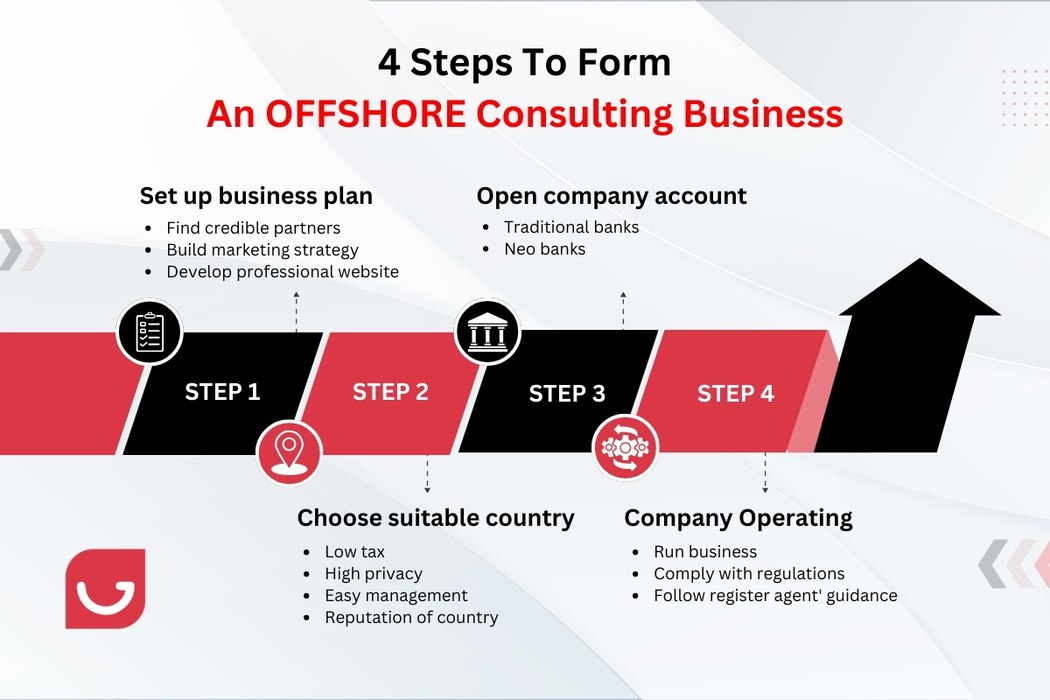Just How Offshore Business Formations Job: A Detailed Summary for Entrepreneurs
Offshore firm formations can give significant advantages for entrepreneurs looking for tax optimization and possession security. The process involves numerous crucial actions, beginning with careful territory selection and extensive documentation prep work. Involving expert services is important for compliance. Several neglect the recurring responsibilities that follow initial enrollment. Recognizing these complexities can make a substantial distinction in leveraging overseas chances successfully. The next actions are essential for long-lasting success.
Understanding Offshore Business: What They Are and Why They Matter
The idea of overseas companies may appear facility, understanding their essential nature and significance is vital for both organizations and individuals looking for to enhance their monetary approaches. Offshore firms are entities signed up outside the person's nation of residence, commonly in jurisdictions that use positive governing atmospheres. These organizations can provide various benefits, such as tax optimization, possession security, and improved privacy.
For entrepreneurs, developing an offshore business can facilitate worldwide trade, decrease operational costs, and increase market reach. In addition, overseas business commonly enable structured conformity with worldwide laws. People may also utilize offshore frameworks to protect individual properties from economic or political instability in their home nations. Ultimately, the appeal of overseas business depends on their capacity to boost economic flexibility and provide critical advantages in a progressively interconnected international economic climate - Offshore Company Formations. Comprehending their functional framework and benefits is vital for making notified choices
Picking the Right Jurisdiction for Your Offshore Business
Selecting the appropriate jurisdiction for an offshore firm is crucial for taking full advantage of tax obligation benefits and guaranteeing conformity with local regulations. Various jurisdictions offer differing tax obligation motivations and regulatory environments that can greatly influence organization procedures. Subsequently, a careful analysis of these elements is important for informed decision-making.
Tax Advantages Overview
When taking into consideration the establishment of an overseas business, recognizing the tax benefits related to various jurisdictions is essential. Different areas offer distinct benefits, such as low or no business tax obligation rates, which can substantially enhance productivity. Some territories give tax obligation incentives for details types of companies, bring in entrepreneurs seeking decreased tax responsibilities. In addition, particular nations apply desirable tax treaties that lessen dual taxes on worldwide income, making certain that services preserve even more profits. The choice of territory likewise impacts value-added tax (BARREL) and other regional taxes. Entrepreneurs must assess these aspects thoroughly to pick a location that straightens with their service goals, maximizing tax performance while continuing to be certified with worldwide regulations.
Regulatory Setting Considerations
Picking the appropriate territory for an overseas company requires a detailed understanding of the governing atmosphere, as various nations impose differing degrees of conformity and administration. Entrepreneurs need to review elements such as lawful frameworks, tax obligation guidelines, and reporting commitments. Territories like the British Virgin Islands and Cayman Islands are usually preferred for their business-friendly legislations and marginal reporting requirements. On the other hand, some nations might impose rigorous guidelines that might make complex operations and increase expenses. Additionally, the political security and online reputation of a jurisdiction can influence the lasting stability of the overseas business. Cautious consideration of these governing aspects is essential to guarantee that the picked territory aligns with the company's critical goals and functional requirements.
Functional Preparing the Required Paperwork
Preparing the essential paperwork is a necessary step in the offshore business formation process. Entrepreneurs need to collect various legal and identification records to promote their firm's establishment in an international jurisdiction. Usually, this includes an in-depth organization strategy detailing the company's goals and operational strategies. In addition, personal recognition papers, such as keys or vehicle driver's licenses, are called for from the company's supervisors and investors.
Oftentimes, proof of address, like energy expenses or bank statements, is required to confirm the identifications of the involved parties. Details types dictated by the territory, consisting of application kinds for registration, should be finished properly. Some jurisdictions may also require an affirmation of the nature of company activities and conformity with local policies. Extensively preparing these files guarantees a smoother registration procedure and aids alleviate potential delays or difficulties, eventually establishing a solid structure for the overseas entity.
Involving Professional Solutions for Offshore Formation
Engaging expert solutions in overseas development can greatly enhance the performance and performance of the process. Business owners often encounter intricacies that can be overwhelming, making experienced advice important. Specialist companies concentrating on offshore formations provide a wide range of understanding concerning territory selection, firm structure, and local market problems.
These specialists can aid in composing vital paperwork, guaranteeing precision and compliance with certain requirements. They additionally aid enhance communication with local authorities, minimizing the possibility of misunderstandings or hold-ups. Additionally, expert solutions can offer understandings into critical benefits, such as tax advantages and property security, customized to the entrepreneur's particular demands.
Navigating Regulatory Conformity and Legal Requirements
Comprehending the governing landscape is essential for entrepreneurs beginning on offshore company formations. Conformity with international policies and regional legislations is essential to prevent lawful risks. Each jurisdiction has details needs regarding firm registration, reporting, and tax, which must be completely investigated.
Entrepreneurs must acquaint themselves with the laws controling business framework, possession, and functional practices in the selected offshore location. In addition, anti-money laundering (AML) and recognize your customer (KYC) policies frequently apply, calling for correct documentation and confirmation processes.
Engaging with attorneys that focus on overseas solutions can give indispensable assistance on navigating via these complexities. Making sure conformity not only safeguards the business from possible lawful concerns however likewise enhances trustworthiness with companions, regulators, and capitalists. By adhering to the recommended lawful frameworks, business Home Page owners can successfully leverage the benefits of overseas business formations while lessening dangers related to non-compliance.
Setting Up Financial and Financial Accounts

As soon as an appropriate financial institution is recognized, entrepreneurs usually require to prepare and submit various papers, including evidence of identity, company enrollment files, and a description of the desired business activities. (Offshore Company Formations)
Some financial institutions might additionally call for a minimal down payment to open up an account. Entrepreneurs need to be prepared to answer inquiries pertaining to the source of funds and service procedures. By thoroughly understanding the financial landscape and adhering to the bank's requirements, business owners can secure their overseas company has seamless access to important financial services for reliable procedure.
Maintaining Your Offshore Company: Continuous Responsibilities and Best Practices
Maintaining an offshore business includes a number of recurring duties that are vital for compliance and functional integrity. Secret facets consist of sticking to yearly conformity requirements, maintaining precise economic documents, and understanding tax obligation commitments. These elements are necessary for making certain the company's durability and legal standing in its jurisdiction.
Yearly Compliance Requirements
While developing an offshore firm offers various advantages, it additionally entails ongoing obligations that can not be ignored. Yearly conformity needs differ by territory however generally consist of sending financial statements and annual returns to local authorities. Companies need to likewise pay annual fees, which can consist of registration revivals and tax obligations, depending upon the place. In enhancement, numerous jurisdictions call for maintaining a local rep and an authorized office. Failure to adhere to these guidelines can cause penalties, including penalties and even dissolution of the firm. Entrepreneurs need to also be mindful of any kind of modifications in local legislations that might impact their conformity responsibilities. Remaining notified and organized is essential for keeping the advantages of an offshore firm while fulfilling legal duties efficiently.
Maintaining Financial Records
Conformity with yearly needs is only component of the continuous duties connected with offshore business administration. Maintaining accurate monetary documents is important for ensuring transparency and responsibility. Business owners have to systematically document all purchases, including income, costs, and assets. This practice not only help in interior decision-making however likewise prepares the firm for potential audits from regulative authorities.
Frequently upgrading financial statements, such as earnings and loss accounts and balance sheets, is crucial for tracking the company's monetary wellness. Utilizing audit software application can enhance this procedure, making it easier to generate records and keep compliance. On top of that, entrepreneurs need to consider seeking professional accountancy solutions to assure adherence to local regulations and best practices, consequently safeguarding the integrity and reputation of their overseas procedures.

Tax Obligations Review
Steering through the intricacies of tax responsibilities is necessary for the successful monitoring of an offshore business. Entrepreneurs have to comprehend the tax obligation laws of both their home nation and the jurisdiction where the offshore entity is developed. Compliance with neighborhood tax legislations is important, as failing to stick can result in penalties or legal problems. Regularly filing essential tax returns, also when no tax obligation might be owed, is usually needed. In addition, keeping precise and up-to-date monetary records is important for demonstrating conformity. Inquiring from tax specialists knowledgeable about global tax law can help browse these responsibilities properly. By implementing best techniques, business owners can guarantee that their offshore operations stay monetarily sensible and lawfully certified.

Frequently Asked Questions
How much time Does the Offshore Company Development Refine Normally Take?
The offshore firm formation process normally ranges from a few days to visit this site numerous weeks. Aspects influencing the timeline consist of jurisdiction, documentation requirements, and responsiveness of lawful and monetary institutions entailed in the configuration.
What Are the Costs Related To Maintaining an Offshore Firm?
The prices linked with preserving an offshore company can differ commonly. They normally include yearly enrollment charges, compliance costs, accounting solutions, and possible legal costs, depending on the territory and specific business activities entailed.
Can I Open Up a Personal Savings Account for My Offshore Firm?
Opening a personal bank account for an offshore business is typically not allowed. Offshore accounts should be organization accounts, showing the company's tasks, thus abiding by guidelines and making certain appropriate economic management and legal responsibility.
Exist Restrictions on Foreign Possession of Offshore Business?

What Occurs if I Fail to Conform With Offshore Regulations?
Failure to adhere to offshore laws can result in extreme fines, including substantial fines, loss of service licenses, and possible criminal charges. Additionally, non-compliance might cause reputational damage and difficulties in future company procedures.
Offshore firms are entities registered outside the individual's country of home, commonly in jurisdictions that offer beneficial regulatory atmospheres. Picking the appropriate jurisdiction for an offshore business is essential for making the most of tax obligation advantages and guaranteeing conformity with local guidelines. When taking into consideration the establishment of an offshore company, recognizing the tax obligation advantages linked with numerous territories is important. Selecting the right territory for an overseas firm calls for a comprehensive understanding of the regulatory setting, as different countries enforce differing levels of conformity and administration. Furthermore, the political stability and credibility of a territory can influence the lasting feasibility of the overseas company.